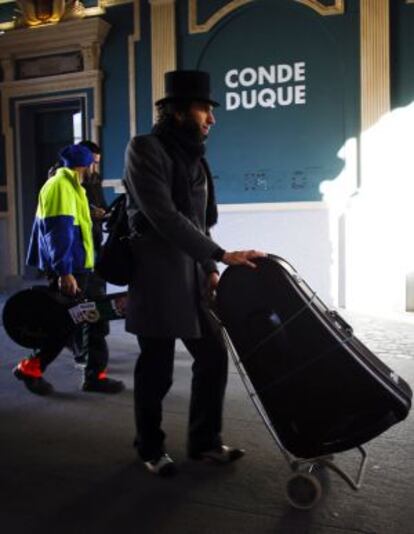Guitars, trumpets and nerves
Madrid begins the new audition process for its street musicians The number of licenses available and the selection criteria are not yet known

Nicoleta Fileata walked into the Conde Duque cultural center on Monday morning with her stomach in knots. She had spent the entire previous day singing in the Madrid subway, and was afraid her voice might not be in good shape for the audition.
The city of Madrid has begun auditioning street musicians, who must now carry a license to be able to perform. Fileata, who arrived here from Romania 12 years ago and sings on the streets to feed herself and her son, was a bundle of nerves right before the test. And the mix-up at the door did not help calm her down, either.
“They thought I was a journalist and wouldn’t let me in,” she said, pointing to the microphone and amplifier she carried inside a sling bag.
All around her, guitars, trumpets, accordions and other instruments were tuning up. Some musicians simply sat and waited patiently for their turn to play for a few minutes before a jury.
They signed up for the audition over a month ago, and were given appointments between Monday and Wednesday of this week. According to city officials there were 350 applicants, although the agglomeration at the door on Monday morning suggested different figures.
“At 1pm we got a lot of people here, things were calmer in the morning,” explained one of the organizers.
“I thought I had six minutes, and when I went in they told me I only had three,” said Álex Delgado, a 20-year-old physics student at Autónoma University who plays with friends on weekends to make a little extra cash. “I asked them what the rules were, and they said to simply play whatever I wanted.”
In theory, the jury sitting inside Room 1 of the cultural center is made up of two musicians and a municipal secretary, whose job it is to decide whether the applicants are good enough to “entertain the public without bothering neighbors or passers-by.” The license is free of charge and good for a year, although it can be extended to five.
Applicants must be able to “entertain the public without bothering neighbors”
The auditions are the result of an October decision by Madrid officials to declare the city center an Area of Special Acoustic Protection. The new status comes with a raft of rules regarding the decibels that are allowed at various times of the day. One of the regulations states that street performers can only play from 10am to 10pm, with a pause in the middle for siesta time.
On day one of the auditions, the halls of Conde Duque were full of musicians of all nationalities and instruments in all shapes and sizes. The largest were two hammered dulcimers, typical of Eastern Europe and the size of a kitchen table, with four wooden legs and strings stretching across the top. But there were also flutes, trumpets, accordions, guitars (many, many guitars) and even a home-made table bearing wine glasses that played different notes when rubbed.
“If they make me play in a specific spot, I might not be interested,” explained Juan, an unemployed child psychologist whose guitar has become his sole source of income. He figures he makes between three and 10 euros an hour. “I am my own amplifier and I can’t play on just any street because people can’t hear me.”
The new regulations establish that musicians may only perform on streets that are at least seven meters wide, and that they must not block the way for passers-by or vehicles, or stand in front of doors leading to apartment buildings or business premises. Nor can they block the view of storefront display windows.
Madrid is not the first city to set rules for street musicians. While performing on the street is completely forbidden in Valencia, Barcelona began regulating it in 2004, coinciding with a boom in street performers — and the number of complaints from residents about them. Since then, the rules have changed. While 500 people expressed an interest in playing on the streets of the Catalan capital the first year that the license system was in effect, this year there were only 140 applicants. The only requisite for obtaining a permit is to ask for one. If the city receives more than 140 applications, it organizes a draw. But the number of interested musicians keeps going down every year, reports Jordi Mumbrú.
Nobody knows yet how many licenses Madrid will be giving out. Nor is it clear what the musical criteria for selecting winners will be. In any case, quality testing will not be a deterrent for people who make a living off their music.
Asked about the possibility of being denied a permit, Nicoleta Fileata gave an emphatic if somewhat hoarse reply: “If I stop singing, I stop eating. I have no other way to live.”
Tu suscripción se está usando en otro dispositivo
¿Quieres añadir otro usuario a tu suscripción?
Si continúas leyendo en este dispositivo, no se podrá leer en el otro.
FlechaTu suscripción se está usando en otro dispositivo y solo puedes acceder a EL PAÍS desde un dispositivo a la vez.
Si quieres compartir tu cuenta, cambia tu suscripción a la modalidad Premium, así podrás añadir otro usuario. Cada uno accederá con su propia cuenta de email, lo que os permitirá personalizar vuestra experiencia en EL PAÍS.
¿Tienes una suscripción de empresa? Accede aquí para contratar más cuentas.
En el caso de no saber quién está usando tu cuenta, te recomendamos cambiar tu contraseña aquí.
Si decides continuar compartiendo tu cuenta, este mensaje se mostrará en tu dispositivo y en el de la otra persona que está usando tu cuenta de forma indefinida, afectando a tu experiencia de lectura. Puedes consultar aquí los términos y condiciones de la suscripción digital.








































